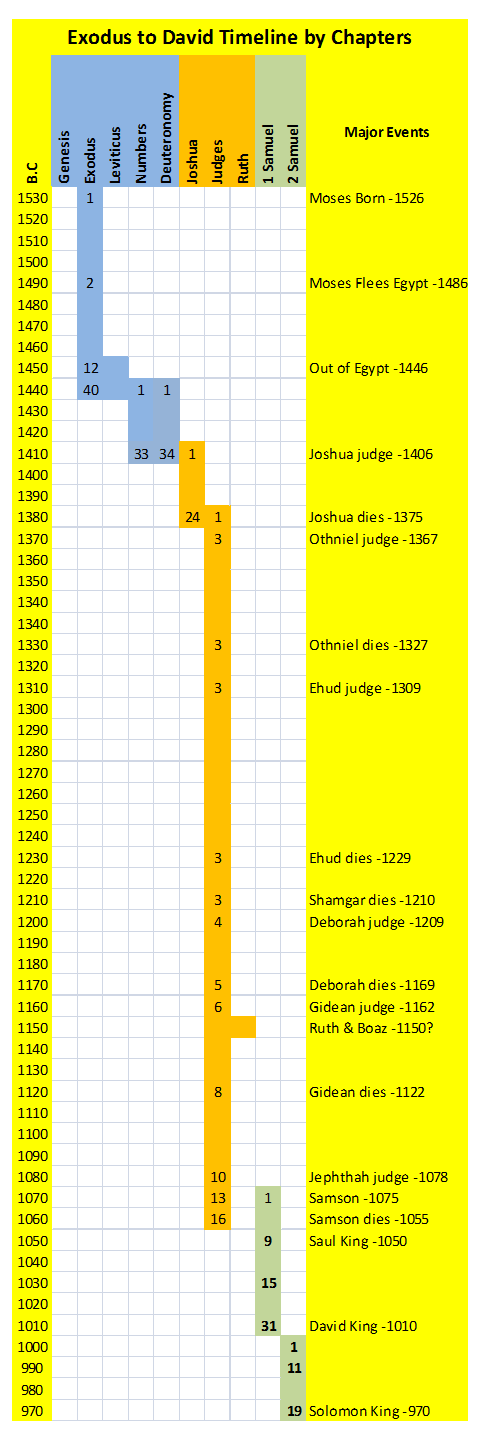INTRODUCTION TO DEUTERONOMY
Time: Around 1,400 B.C.
Place: East of the Jordan River
Main character: Moses and Israel
Main teaching: Remember and Obey the Sovereign Lord, God of Israel
Author: Moses
Book Key Verses: Deuteronomy 2:47, 4:37, 6:26.
QUESTIONS TO STUDY ONE
OUTLINE
ISRAEL HISTORY
Before analyzing the test of any book of the Bible, it is well to learn the historical background.
Also, it is best to make a "skyscraper" view of its general contents. Accordingly, this introduction is divided into two parts: background and survey.

- BACKGROUND
- Author. Moses
- Deuteronomy was written by Moses just before Israel entered the promised land.
- Deuteronomy is in general a repeat of the law as recorded in Exodus and Leviticus.
- Moses wanted the people to hear the law again before they entered the promised land. They had heard it as youths forty years earlier. Moses was not going to enter the promised land, but be taken to the Lord. Out of compassion he wanted them to hear the law so that they would know what was expected of them being God's chosen nation.
- Date and Place of Writing
- Deuteronomy was written on the east side of the Jordan River.
- Deuteronomy was written approximately 1,500 B.C. first by Moses and finalized just after his death. This can be seen in some third party references to Moses and referring to the land east of the Jordan as "Beyond the Jordan".
- Addressee
- Deuteronomy is addressed to the Israelites.
- The Israelites who first heard this account was the second generation after the Lord took them out of Egyptian slavery.
- Deuteronomy is also important to us because it gives us accounts of things not recorded in the other four books that Moses wrote (Genesis, Exodus, Numbers, and Leviticus.)
- Occasion and Purpose
- Deuteronomy was written out of compassion and concern. The Israelites who first heard this were under a covenant that their parents had made, but did not keep. The Lord and Moses did not want this generation to make the same mistake that their parents had made.
- Entering the Promised Land was going to be a new experience for them. It would not be easy. They had to win the land by faith and obedience to the Lord their God. They had learned the basics in the last forty years. Now the training was done. A new generation under a new leader would experience the Lord's work and will in a new and great way, if they kept the covenant that they and their parents had committed to.
- Israel's exodus from Egypt and the covenant at Sinai were the stages of Israel's birth as a nation. As yet they were a nation without a homeland. God's covenant with Israel at Sinai was in part a renewal of earlier covenants made with the patriarchs. Included in those covenants were the following promises: (1) that Israel would be God's special nation, (2) that Yahweh God would be their God, (3) that they would be obedient to God, and (4) that God would give them a homeland and innumerable descendants. (Holman Bible Dictionary)
- Remembering, studying, and repeating is important as we continue our lives of faith. Jesus repeated his teaching and experiences with and for his disciples for the same reason.
- Form and Style
- FORM.
Deuteronomy is written as a historical account of the former forty years, from Mount Sinai on, while looking into what was required in the future by obeying the law of the covenant.
- STYLE.
Deuteronomy is a first hand personal account of events that had taken place in the life of Moses the author with a vision of the future. Some have called it three sermons.
- Place Among the Old Testament Books
- Deuteronomy is the last of five books written by Moses.
- Deuteronomy is a recount of the law. It is the English name of fifth book of Old Testament taken from Greek translation meaning, "second law." Deuteronomy should not be read in isolation from the other four books.
- Pentateuch (five books) is the familiar title associated with these five books of Law, the first and most important division of the Hebrew Bible.
- SURVEY
Deuteronomy is in general written as a historical account and a law book, while not being either. It contains three addresses of Moses to the Israelites. After the introductions (Deut. 1:1-5) is the first address, Deut. 1:6-4:40; followed by the set up of cities east of the Jordan River, Deut. 4:41-43. The second address is Deut. 4:44-28:68 containing instructions for life in the land of Canaan. Moses' third and final address in Deut. 29:1-30:20, a renewal of the covenant made at Mount Sinai. Deut. 31 is Moses farewell address for he would not be entering the Promised Land with them. He blesses them in Deut. 33 and his death is recorded in Deut. 34.
STUDY 1 QUESTIONS
STUDY 1 COMMENTS
|























